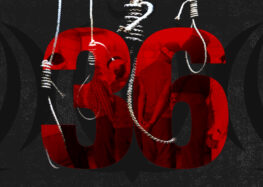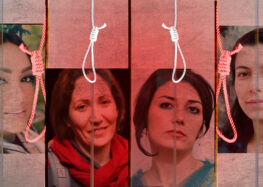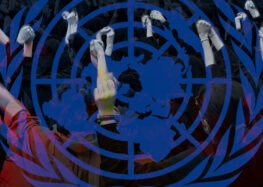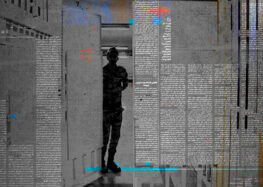Urgent Appeal: Civil Society Groups Implore UN Official to Postpone Iran Visit
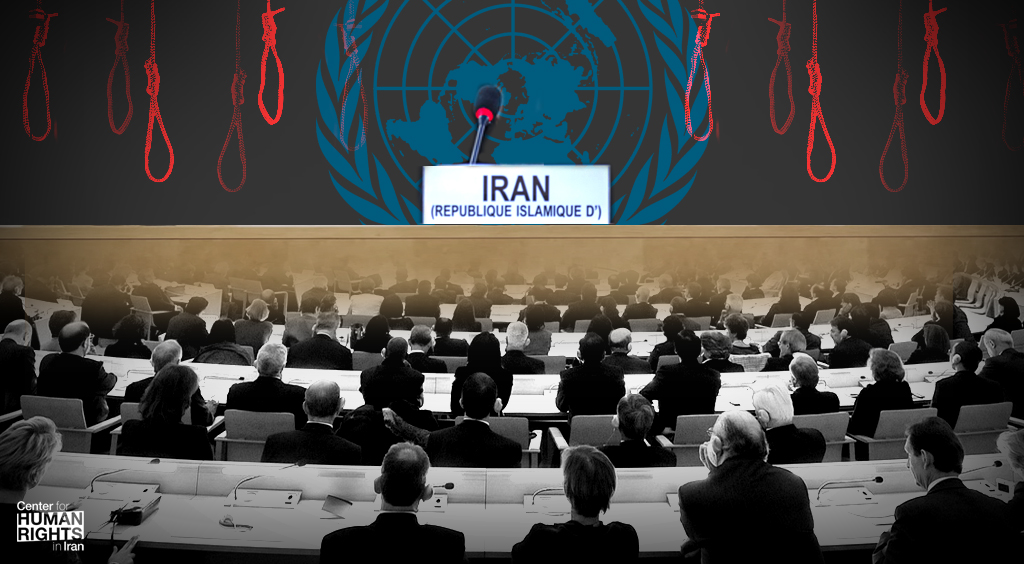 Amid Escalating Executions and Rights Violations, Trip Risks Being Exploited as State Propaganda
Amid Escalating Executions and Rights Violations, Trip Risks Being Exploited as State Propaganda
January 29, 2024 – A coalition of international human rights organizations, including the Center for Human Rights in Iran (CHRI), today implored UN Deputy High Commissioner for Human Rights Nada Al-Nashif to postpone her trip to Iran, scheduled for February 3.
In a joint letter signed by 25 international organizations that was released today, the groups emphasized the Office of the United Nations High Commissioner for Human Rights’ (OHCHR) responsibility to prevent its legitimate engagement from becoming a tool to undermine critical mechanisms for advancing human rights in Iran.
“To avoid this, we urge you to reconsider the timing of this visit and implement a robust strategy to mitigate this risk,” said the letter.
The surge in executions in the Islamic Republic is deeply concerning, with four ethnic Kurdish political prisoners executed today and more than 50 hanged within the first month of this year. A visit without engaging with families of death row prisoners, prisoners of conscience, and civil society inadvertently signals tacit approval of the state’s oppressive policies, including the imprisonment and execution of dissidents and political prisoners.
Embarking on this trip before the release of the UN’s independent Fact-Finding Mission’s initial report on atrocities committed by the Iranian government during the nationwide protests of 2022-23, which is set to be presented during the 55th session of the UN Human Rights Council (HRC) in a few weeks, would also jeopardize the mission’s mandate.
“The trip is poised to be shamelessly exploited as a propaganda ploy, a deceptive show of cooperation with the UN just before the release of the Fact-Finding Mission’s initial report. This comes even as the Iranian government has consistently refused to cooperate with the FFM from the very beginning,” cautioned Hadi Ghaemi, Executive Director of CHRI.
“The Islamic Republic is ready to cynically manipulate this UN official’s visit, using it as a tool to whitewash its abysmal human rights record,” he added.
Read the complete letter below.
Open letter to UN High Commissioner for Human Rights Volker Türk and to UN Deputy High Commissioner for Human Rights Nada Al-Nashif
Monday 29 January 2024
Mister High Commissioner, Madame Deputy High Commissioner,
We, civil society organizations working to promote human rights in the Islamic Republic of Iran, are gravely concerned by the announced visit of Deputy High Commissioner Nada Al-Nashif to the Islamic Republic of Iran from 2 to 5 February 2024.
We acknowledge the value of dialogue and engagement, and we acknowledge that the Office of the High Commissioner for Human Rights (OHCHR) has a legitimate interest in engaging with authorities from all countries – including the most difficult ones – on human rights challenges. We also fully appreciate that such engagement is an integral part of your mandate.
However, in this specific instance, the timing of this visit, the context in which it would take place and its modalities raise very serious concerns. We respectfully urge you to hear these concerns and to reconsider the opportunity, timing and modalities of this visit.
First, the timing of this visit is for us of utmost concern. As scheduled, it would take place just a few weeks before the start of the 55th session of the UN Human Rights Council (HRC), risking interfering with a crucial session during which the Council will hear reports from and discuss the future of the two existing mandates on human rights in Iran: the UN Special Rapporteur on human rights in Iran and the UN Independent International Fact-Finding Mission on the Islamic Republic of Iran.
Informed by past experiences, we can anticipate that Iranian authorities will attempt to instrumentalize their formal engagement with your Office and use it as a propaganda tool to undermine support for these existing and very needed monitoring, reporting and investigative mechanisms established by the HRC. While we value diplomatic engagement as complementary to regular monitoring, public reporting and investigation work, we also know that Iranian authorities, in line with their consistent position, defended publicly time and again at the Human Rights Council, will play diplomatic engagement against accountability mechanisms.
In this context, we firmly believe that OHCHR has a responsibility not to let its legitimate engagement activities be instrumentalized to undermine other mechanisms that are critical to the promotion and protection of human rights in Iran. To avoid this, we urge you to reconsider the timing of this visit, and to have a robust strategy to mitigate this risk.
Secondly, we are concerned that a visit in the current context is unlikely to yield positive results. We wholeheartedly agree with your assessment that the issues of the death penalty and of the rights of women and girls need urgent attention. However:
-
-
- We must remark that Iranian authorities have shown no sign of political will to address these long-standing issues. This visit would take place amid an alarming surge in executions, as you rightly stressed Mr. High Commissioner in a recent statement[1], including the execution earlier today of four Kurdish prisoners, that follows the execution last week of a young man with mental disability sentenced in connection with his participation in the 2022 protests and of a Kurdish prisoner, all sentenced to death following grossly unfair trials and despite repeated calls to stop these executions. The visit would also take place in a context marked by the deadly, violent and unlawful repression of the nationwide Women, Life, Freedom movement, and the aggravation of degrading and discriminatory legislations and policies targeting women and girls. Iranian officials’ public statements, as well as their legislative and executive acts, clearly point to a blanket rejection of demands for human rights reforms on these two issues.
- We also remark that Iranian authorities have extensively used Iran’s repressive machinery to reduce civic space, censor discussion of these issues, and persecute women’s human rights defenders and anti-death penalty activists, as abundantly documented by your Office. A symbol of this ongoing persecution is the continued imprisonment and recent fresh sentences given to Nobel Peace Prize Laureate and anti-death penalty and women’s rights activist Narges Mohammadi.
- We add that Iran’s recent refusal to discuss death penalty and certain aspects of women’s rights with the UN Human Rights Committee during the review of its periodic report in October 2023, as well as Iran’s refusal to allow any mention of human rights or gender equality in its recently signed UN Sustainable Development Cooperation Framework Agreement (UNSDCF)[2] cast a very serious doubt as to Iranian authorities’ genuine and serious commitment to addressing meaningfully these human rights issues through their engagement with the UN.
-
In this context, we can only be skeptical about the concrete outcome and the benefit of a high-level visit to Tehran for the advancement of the human rights of the Iranian population, unless it includes a strong monitoring component, guarantees of access to independent civil society actors, to human rights defenders, including unmonitored exchanges with defenders arbitrarily detained and support for their liberation.
These components would in our view fully justify the need for an in-country visit, as opposed to other modalities of engagement, such as the current continued and regular engagement of OHCHR with Iranian officials in Geneva.
We fear however that – failing to include these monitoring elements – a high-level visit from OHCHR to Tehran, in the current context and at this specific time, is not only unlikely to result in progress on the two human rights issues in focus, but is also likely to be misused by Iranian authorities as a propaganda tool to undermine existing UN mandates. This situation could ultimately undermine the trust placed in the UN system by Iranian human rights defenders, by victims of human rights violations in Iran and by the population at large.
For all these reasons, we respectfully urge you, Mister High Commissioner, Madame Deputy High Commissioner, to carefully reconsider the opportunity, timing and modalities of that visit.
Yours faithfully,
Abdorrahman Boroumand Center for Human Rights in Iran
Ahwaz Human Rights Organization
All Human Rights for All in Iran
ArcDH – Association pour la défense des droits de l’homme et des revendications démocratiques / culturelles du peuple Azerbaidjanais – Iran
ARTICLE 19
Association for the Human Rights of the Azerbaijani People in Iran (Ahraz)
Baloch Activists Campaign
Balochistan Human Rights Group
Center for Human Rights in Iran
Defenders of Human Rights Center
Ensemble Contre la Peine de Mort (ECPM)
FEMENA
Haalvsh
Impact Iran
Iran Human Rights
Iran Human Rights Documentation Center
Justice for Iran
Kurdistan Human Rights Association – Geneva
Kurdpa Human Rights Organization
Rasank
Siamak Pourzand Foundation
United4Iran
Unrepresented Nations and Peoples Organization (UNPO)
Women’s International League for Peace and Freedom (WILPF)
6rang (Iranian Lesbian & Transgender Network)
[1] https://www.ohchr.org/en/statements/2024/01/un-high-commissioner-human-rights-volker-turk-alarmed-sharp-spike-use-death
[2] https://unsdg.un.org/sites/default/files/2022-11/UNSDCF_Iran%20Republic%20of-2023-2027.pdf


